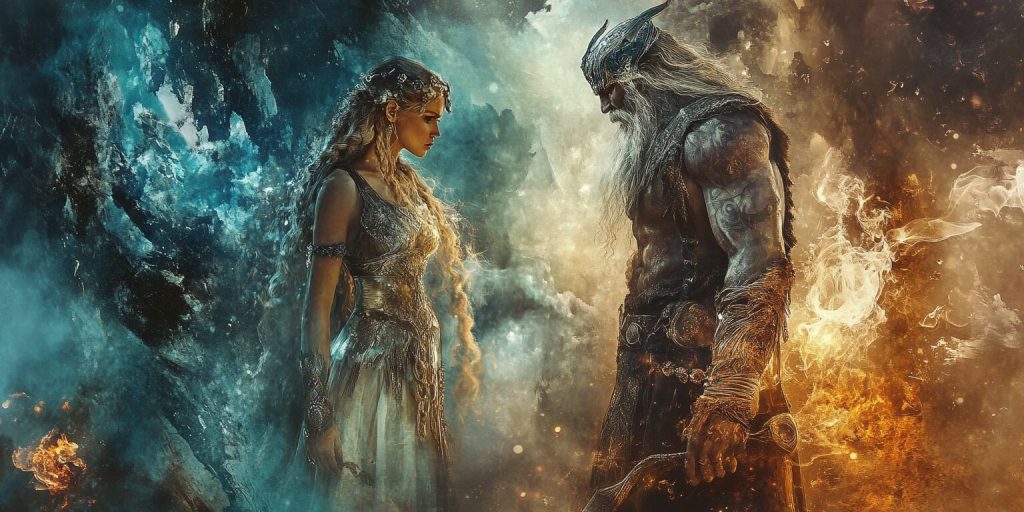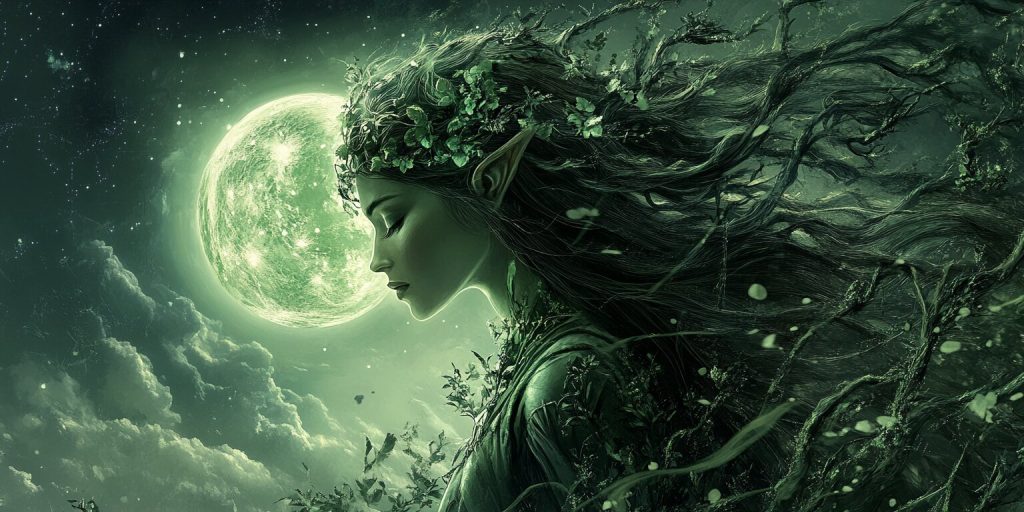Aesir Goddesses, Aesir Gods, Baldur, Frigg, Hermod, Hodr, Loki, Norse Goddesses, Norse Gods, Norse Mythology
Exploring Nanna: The Tragic Goddess of Norse Mythology
Nanna is a lesser-known goddess in Norse mythology. She is known for her deep love and tragic story. As the goddess of devotion, she is famous for her loyalty to her husband, Baldr. Baldr is the son of Odin and Frigg.
Many wonder: Who is Nanna, and what is she the goddess of? Nanna’s story is more than her love for Baldr. It shows her strong commitment and the deep sadness in her myth.
This look into Nanna’s life aims to highlight her importance in Norse stories and explore her impact on today’s Norse Paganism. By learning about her, we can see the deep stories of Norse mythology and her lasting love.
Introduction to Nanna Norse Mythology: The Goddess of Love and Devotion
In Norse mythology, Nanna is known for her deep connection to love and devotion. She is often regarded as a gentle goddess. As the wife of Baldr, a well-known Norse god, she shows what it means to be a loyal partner.
So, what is Nanna the goddess of? This goddess is all about joy and peace. She is the goddess of joy and holy love. Her stories often show her bringing calm and happiness, making her a gentle goddess and a symbol of peace in Norse beliefs.
The Prose Edda and the Poetic Edda tell their story. These books show her many roles and how she touched many parts of love and devotion. The stories in these ancient texts show her importance to the Norse gods.
The Tragic Tale of Nanna and Baldr
The story of Baldr and Nanna is sad in Norse mythology, illustrating the pain of separation in the face of a powerful deity. Baldr was loved for his innocence and beauty, much like Nanna Nepsdóttir, who embodies unwavering devotion. He was married to Nanna, a goddess known for her love and dedication. Their story starts with Baldr’s death, caused by Loki, the trickster god.
Loki made a cruel prank that led to Baldr’s death. He tricked Höðr, Baldr’s blind brother, into throwing a dart made of mistletoe at Baldr. This event was a huge loss for the Norse gods, bringing great sadness to Nanna.
After Baldr died, Nanna was filled with grief and died too. Her love for Baldr was strong, showing her deep sadness and the emotional depth of her character. Baldr and Nanna had a son named Forseti, who became the god of justice and reconciliation.

Sources like Saxo Grammaticus’s Gesta Danorum describe Nanna’s death in detail. They show how the gods mourned the loss of Baldr and Nanna. This event shows even the strongest can fall to fate and trickery, much like the tales of the Norse deities.
The story of Baldr and Nanna teaches us about love, loss, and loyalty, emphasizing the traits of a true Norse deity. It reminds us of the deep emotions in ancient Norse myths. Their bond through their son, Forseti, shows their lasting impact on the pantheon of Norse deities.
Nanna’s Journey to Hel
When Nanna dies, her soul goes to Hel, the underworld ruled by the goddess Hel. This journey is filled with tragedy and deep love. She goes to Hel after her husband, Baldr, dies too soon.
Nanna’s love for Baldr is so strong that she follows him even after his death. Hermóðr, a brave god, then tries to bring Baldr back to life. Nanna joins Hermóðr on this quest, showing her deep love and unwavering loyalty.
Her meetings in Hel reveal what the Norse believed about life after death. These stories show the strong bond between Nanna and the other gods and how love can transcend even death, adding to Norse mythology.
Nanna in Norse Mythological Texts
The stories of Norse mythology come to life in the Prose Edda and the Poetic Edda. These books tell us about many gods, including Nanna. Snorri Sturluson wrote the Prose Edda, which tells Nanna’s story. It shows her deep bond and sad fate with Baldr, highlighting her role as a gentle goddess in Norse tales.
The Poetic Edda also talks about her mixing poetry with myth. This shows her lasting love and sadness.
Other old stories add more to Nanna’s story. Saxo Grammaticus, a famous historian, has his views. His stories sometimes differ from the old Norse tales. Looking at these different stories helps us understand Nanna better.
Now, scholars are still discussing Nanna and her role. They look at how she might be linked to other mythological figures. This shows how important Nanna is in Norse stories and makes us think more about her legacy.
Nanna’s Role Among the Norse Gods
Nanna is a key figure in the Æsir, the main group of Norse gods. She is a goddess known for her deep connection to love and devotion. This makes her similar to other gods like Frigg and Odin.

Nanna is seen as a symbol of both tragedy and strength. Her story with her husband, Baldr, shows how important she is. Her bond with Frigg, Baldr’s mother, makes her even more significant.
Nanna’s impact is seen in the lives of the gods and their families. She shows the values of the Norse gods, like loyalty and the strength to get through hard times. Nanna’s role in Norse beliefs shows how much she is still respected and admired today.
The Legacy of Nanna in Modern Norse Paganism
Modern Norse pagans have a strong connection with Nanna, the goddess linked to Baldr. They use ancient myths and digs to bring Nanna into today’s spiritual life.
Nanna might not be as famous as other gods, but she’s important to many Norse pagans. Her inspiring story of love, loss, and loyalty is especially meaningful because of her link to Baldr.
Today, people are getting more interested in Nanna. This fits with a global trend of rediscovering old spiritual beliefs. Scholars and followers see Nanna’s journey to Hel as a deep look at death and the afterlife. It shows how love can last beyond life.
- Norse pagans use Nanna in funeral rites to honor those who have passed.
- They hold festivals and seasonal events to ask Nanna for blessings on family and friends.
- Stories of Nanna teach a broad view of love beyond life and death.
Norse pagans saw Nanna as a symbol of lasting love and the power of being open. They included her in their daily lives and rituals.
Conclusion
Nanna’s story is a deep look into Norse mythology. It shows love, loss, and deep devotion. Her tale touches both old and new fans of stories.
Her story is about joy and peace mixed with sadness. It shows a goddess whose story goes beyond time.
Nanna’s story tells a lot about the Norse people’s culture and beliefs. It discusses loyalty and giving up everything, which makes her a respected goddess in Norse stories.
Looking at Nanna’s story helps us better understand Norse traditions. Scholars and fans keep sharing her tale, which shows how Nanna’s story adds to the rich stories of Norse mythology.
Whether studied historically or practiced today, Nanna’s story still moves us. It teaches us about the lasting power of love, loss, and the search for joy and peace.

